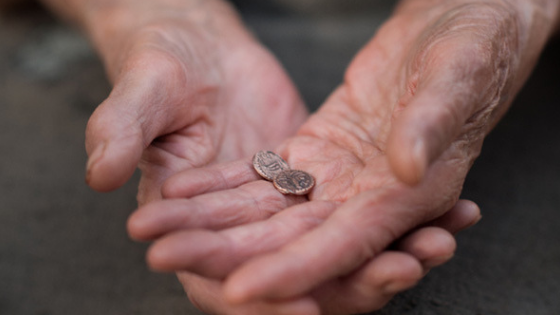
The 5th Sunday in Ordinary Time (04 February 2018)
Job 7:1-4,6-7; Ps 147:1-6; 1 Cor 9:16-19, 22-23; Mk 1:29-39
Theme: Our צבא
Who among us would like to suffer or struggle in this life? I suppose no one. Today’s readings point to this human reality of צבא (tzaba): warfare, struggle, battle, hardship or service. Almost the entire book of Job deals with understanding human suffering, and many of us can identify with him. His struggle is so intense that the way he described is triply-troubled, “days of emptiness, and nights of misery.” By the sound of it, he is tired, in pain, wasted and sees an “end without hope.” Just like him, we long wait for a צל(tzel: shadow), a sort of relief from the struggles we encounter. In the 1st letter of Paul to Corinth, he told them that he accepts his weakness, his pain, because it is through it that he can be one with those who go through hardships. Similarly, Jesus, in the beginning of the gospel of Mark, never had second thoughts of being with people who are inflicted with bodily sufferings. We might have that orthodox belief that Jesus provided a צל (tzel), a relief by curing or solving their daily “battles”. If we remain with this notion, there is a possibility that Jesus might become irrelevant today, because in reality, not all illnesses, deformity and other “battles” we face can be cured or simply solved. Perhaps, we could look at Jesus in a different angle in the gospel, in order to make him relevant to the reality that besets Job, and us.
Recently, biblical scholarship took notice on disability, deformities and bodily concerns in the scripture. Many of the scholars present alternate interpretations on the healing narratives in the gospels. One of them is Dr. Jin Young Choi, who used a postcolonial reading in the gospel of Mark. She suggests that when Jesus touched the people, it is possible that he is likewise touched by the one being touched. She calls this a “somatic engagement”, that is, bodies encounter each other, inside and out. Metanoia is possible in bodily encounters, and Jesus is not immune to metanoia as well. Never forget his humanity. In Jesus daily bodily encounters, especially to those infirm, he could have been touched by their stories, their lives, and their struggles, and so on. He learned not only bodily frailty, but more so, life’s limits. In his “somatic engagements” with peoples, he saw and sensed, inside and out what צבא (tzaba) is. Touching them, he too was touched by them.
Let us give the gospel a concrete context. Have you met someone who is diagnosed with HIV/AIDS, or PLHIV (Person Living with HIV)? Up to this date these people are stigmatized by society, and this makes them צבא (tzaba), suffer all the more. There is no automatic cure for HIV just as yet, but we can lessen their “night of misery”, sense of “emptiness”, compounded troubles when we allow ourselves to encounter them. Let us remove our (homo)phobic tendencies, and listen to these people. Just like Jesus, let us not be afraid to be touched by the people who this society excludes and stigmatizes. Many people suffer not merely because of bodily frailty, but because we stigmatize their condition. We blatantly isolate them, making them alone in their sufferings. Abandoning them is an ultimate pain – it’s rejection.
Perhaps, Jesus’ compassion grew through his constant bodily engagement with peoples. He was not selective; he was and is inclusive, and so should we be. It is only when we overcome our sets of stigma against peoples that we can chant with the psalmist, “Hallelujah! The L-rd heals their broken hearts, and binds up their wounds. The L-rd gives courage to the lowly.” That in the end, there is hope.
For Reflection and Discussion: 1. What are my internalized stigma against people who differs from me? What brought me to this stigmatization? 2. What am I afraid to lose or give whenever I encounter someone in need? Why? 3. When was the time in my life that there was a reversal of things, that is I was touched by the least person or event I expect to challenge my beliefs in a pleasant way? 4. Days from now is the beginning of Lent, how could Jesus’ bodily encounters with the frailty prepare him for his ultimate experience of rejection on the cross?
Bibliography: Choi, Jin Young. Postcolonial Discipleship of Embodiment: An Asian and Asian-American Feminist Reading of the Gospel of Mark. New York: Palgrave Macmillian, 2015.
This week’s Sunday Gospel Commentary was prepared by
Kristine Meneses, Ph.D., Philippines; Bat Kol Alumna 2016
Email address: krstn.rw@gmail.com
[Copyright © 2018]
……………………………………………………………
PLEASE NOTE: The weekly Gospel commentaries represent the research and creative thought of their authors, and are meant to stimulate deeper thinking about the meaning of the Sunday Scriptures. While they draw upon the study methods and sources employed by the Bat Kol Institute, the views and conclusions expressed in these commentaries are solely those of their authors, and do not necessarily represent the views of Bat Kol. Questions, comments and feedback are always welcome.
………………………………………………………………
Bat Kol Institute for Jewish Studies, Jerusalem
1983-2018
“Christians Studying the Bible within its Jewish milieu, using Jewish Sources.”
gill@batkol.info Website: www.batkol.info



